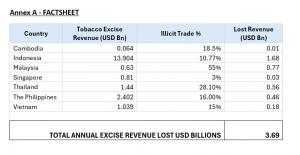Illicit Tobacco to Drain US$11 Billion from ASEAN Budgets by 2028
New Report Shows Loss of Government Revenues Across ASEAN That Could Be Used to Build Hospitals, Schools and Finance Important Social Programs
KUALA LUMPUR, MALAYSIA, November 6, 2025 /EINPresswire.com/ -- Southeast Asian governments are set to lose more than US$11 billion over the next three years to illicit tobacco trade, according to new research published by the Center for Market Education (CME).
CME’s policy brief estimates that the region currently forfeits US$3.69 billion annually in tobacco excise revenue, a drain that continues to erode public finances at a time when many ASEAN economies are still recovering from the fiscal burdens of the COVID-19 pandemic and grappling with global economic uncertainty
.
Based on publicly available data across 7 ASEAN member states , the policy brief highlights that these losses represent nearly 8 percent of the region’s total annual health budgets. The foregone revenue, CME warns, translates into missed opportunities to strengthen essential services such as healthcare, education and climate-resilience infrastructure.
“Losing US$11 billion to illicit trade over three years is not merely a budgetary issue, it is a missed opportunity to invest in people and communities,” said Dr Carmelo Ferlito, Chief Executive Officer of CME. He added that with such funds, governments could finance thousands of new classrooms, modernise hospitals or expand environmental adaptation programmes.
In Indonesia, where illicit tobacco accounts for more than 10 percent of the market, the government loses over US$5 billion in three years – or an estimated US$1.68 billion annually. In October 2025, the Ministry of Finance recorded that budget realization for the Free Nutritious Meals (MBG) program reached IDR 20.6 trillion (around USD 1.23 billion) with 31.2 million beneficiaries. Plugging the current revenue loss could finance the MBG for an additional 42.6 million people.
Meanwhile, Malaysia suffers annual losses of about US$0.77 billion to illicit trade, which is almost equivalent to the projected yearly savings that the government expects from the petrol subsidy rationalization exercise of USD 950 million.
In the Philippines, the government forfeits over ₱25 billion (US$440 million) a year in cigarette excise taxes - greater than its ₱21 billion (US$370 million) calamity fund dedicated to disaster preparedness and climate resilience.
Thailand, with illicit products accounting for about 28 percent of the market, loses roughly US$0.56 billion annually, or close to US$1.7 billion over three years.
Across ASEAN, CME emphasised that these figures are conservative estimates, given that smuggling and counterfeit activities are often under-reported and enforcement capabilities differ widely across ASEAN.
Commenting on CME’s report, CEO of Crime Stoppers International Hayley van Loon cautioned that the illicit tobacco trade is not an isolated fiscal issue but a regional threat with global implications. Criminal networks operating in this space are often linked to other illegal trades - including narcotics, human trafficking and counterfeit goods - sharing logistics channels, laundering mechanisms and trafficking routes. According to van Loon, “these are not small-scale actors but part of organised syndicates, and illicit tobacco is a gateway to wider criminal economies that ultimately cost our societies far more than lost revenue alone.”
While acknowledging enforcement actions from ASEAN countries, as well as regional efforts to crack down on illicit trade by improving cooperation, transparency, and streamlined customs procedures, much more work remains to be done.
“Collectively, ASEAN can reclaim US$11 billion over three years - a transformational sum that could fund critical nation-building priorities,” Dr Ferlito said.
The full policy brief is available here.
About the Centre for Market Education (CME)
The Center for Market Education (CME) is a think-firm with offices in Kuala Lumpur, Malaysia, and Jakarta, Indonesia. Combining the passion of a think-tank with the professionalism of a consulting firm, CME offers expert business advisory, economic and policy analysis, and tailored training services. CME supports policy analysis and advocacy to promote a more business-friendly environment driven by innovation and free-trade principles.
Malminderjit Singh
Terra Corporate Affairs
+65 9012 5184
malsingh@terracorporate.org
Visit us on social media:
LinkedIn
Legal Disclaimer:
EIN Presswire provides this news content "as is" without warranty of any kind. We do not accept any responsibility or liability for the accuracy, content, images, videos, licenses, completeness, legality, or reliability of the information contained in this article. If you have any complaints or copyright issues related to this article, kindly contact the author above.

